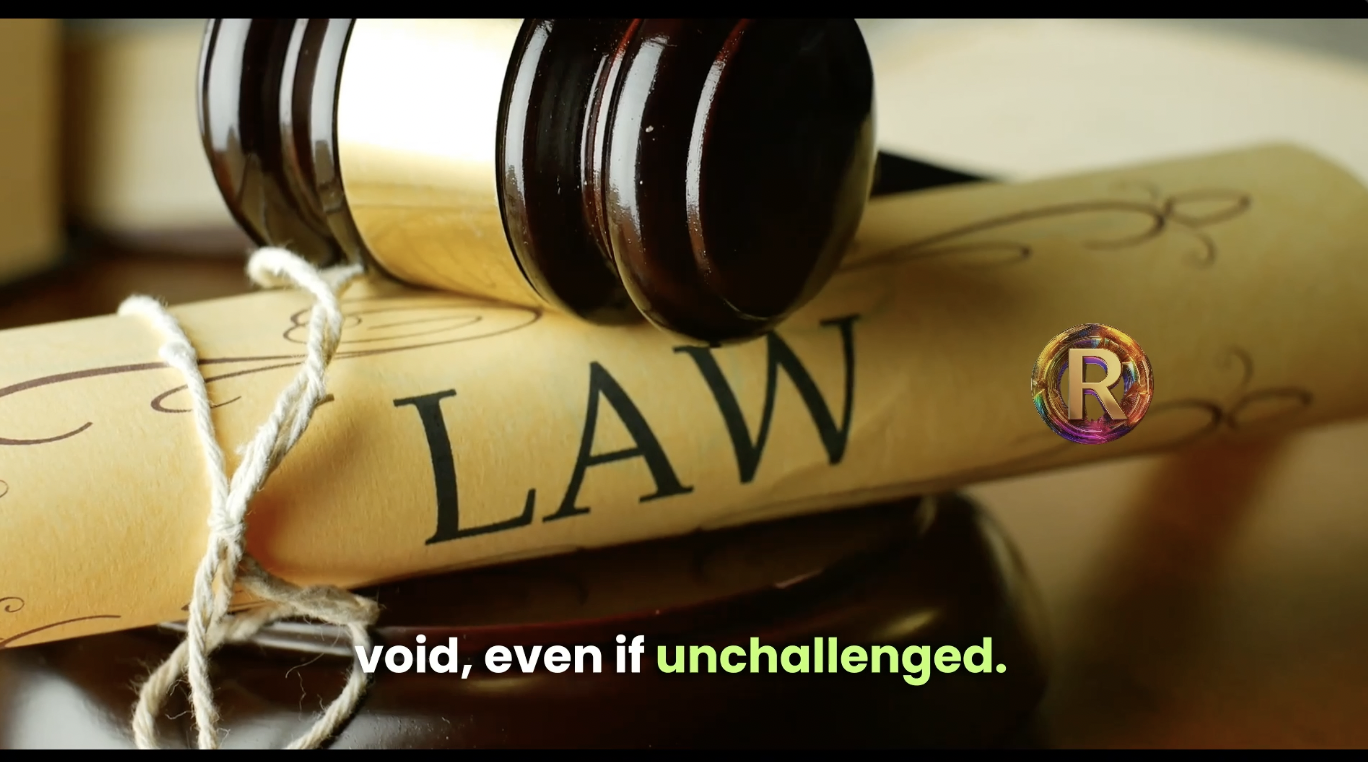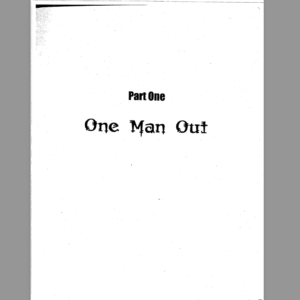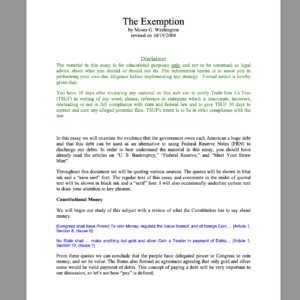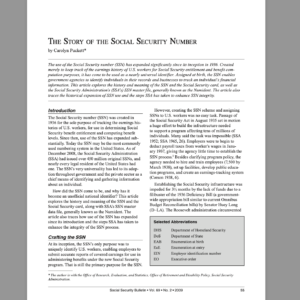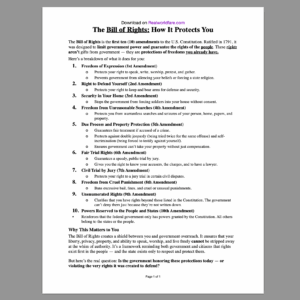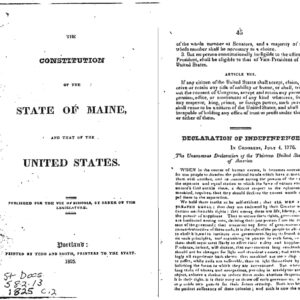In American law, courts are only lawful when operating within clearly defined jurisdictional limits. A judge is not all-powerful—his or her authority must be granted, proven, and exercised within the boundaries of the Constitution and applicable law.
When a court or judge issues an order without jurisdiction, the result is a void order—null and without legal force from the beginning. These orders are void ab initio, and do not require obedience from the American people.
Understanding Jurisdiction: The Cornerstone of Lawful Authority
Jurisdiction is the legal power of a court to hear a case and issue binding decisions. If a court lacks any one of the three essential types of jurisdiction, it has no authority to act, and any order it issues is legally void ab initio—as though it never existed.
There are three types of jurisdiction that must all be present and properly invoked:
1. Subject Matter Jurisdiction
This refers to the court’s legal authority over the type or category of case being brought before it.
Example: A bankruptcy court cannot hear a murder case. A traffic court cannot adjudicate constitutional torts or trust disputes.
If a court does not have subject matter jurisdiction, it cannot proceed—even with consent.
Orders issued in absence of subject matter jurisdiction are void, even if unchallenged.
In re Mooney, 305 F.3d 907 (9th Cir. 2002):
“Subject matter jurisdiction cannot be conferred by consent of the parties. A judgment rendered by a court without subject matter jurisdiction is void.”
2. Personal Jurisdiction (In Personam Jurisdiction)
This refers to the court’s authority over the individuals or entities involved in the case.
A court may only exercise personal jurisdiction if:
-
The individual resides in, is present in, or has minimum contacts with the state or forum
-
The individual voluntarily appears or enters into a contract granting jurisdiction
-
Or the individual fails to object to jurisdiction, thereby waiving it
Private individuals, foreign nationals, and trust entities may not fall under personal jurisdiction—especially if they never entered a commercial or statutory relationship with the state.
Pennoyer v. Neff, 95 U.S. 714 (1878):
“No state can exercise direct jurisdiction and authority over persons or property outside its territory.”
3. Territorial (or Geographic) Jurisdiction
This refers to the court’s authority over the physical area or land in which the case arose or the person resides.
-
A state court cannot issue orders regarding matters that occurred outside the state
-
A corporate administrative judge cannot adjudicate matters involving private land or trust property beyond its statutory boundaries
-
Any stop, seizure, or ruling made outside the appropriate territorial authority lacks jurisdiction by default
United States v. United Mine Workers, 330 U.S. 258 (1947):
“A court must have both subject matter and territorial jurisdiction; otherwise its orders are void.”
If Any One of These is Missing—The Entire Order is Void
Even if a judge means well, or both parties agree to proceed, if the court lacks subject matter, personal, or territorial jurisdiction, its orders are not binding, not lawful, and not enforceable.
Jurisdiction cannot be presumed. It must be proven.
This is why many Americans rightfully assert:
-
“I do not consent to jurisdiction.”
-
“Where is the verified complaint from an injured party?”
-
“This court has no subject matter jurisdiction over my private trust.”
These are not “pseudo-legal” arguments. They are valid, time-tested, and supported by the highest courts in the nation.
You are allowing this @PamBondi @FBI @Kash_Patel @TheJusticeDept @WhiteHouse @POTUS …?
03/19/2025: Articles comes out about unconstitutional Article III judge Jesus G Bernal.
03/19/2025 (same day): Corrupt Article III judge Jesus G Bernal has a private in chambers meeting, by… pic.twitter.com/zVx21XsXZp— ™KEVIN L. WALKER© ESTATE (@KEVINOMICS_) March 30, 2025
Jurisdiction Must Be Proven on the Record
A court or judge must establish jurisdiction on the record. Without it:
-
Orders, warrants, and judgments are void ab initio
-
Officers or agents enforcing such orders may be liable under 18 U.S.C. § 242 (deprivation of rights under color of law)
-
Orders can be challenged at any time, in any forum, without limitation
Lopez v. Fed. Aviation Admin., 318 F.3d 242 (D.C. Cir. 2003):
“Without jurisdiction, the court cannot proceed at all in any cause. Jurisdiction is power to declare the law, and when it ceases to exist, the only function remaining is that of announcing the fact and dismissing the cause.”
Bogus Motions and Railroad Proceedings
Many unlawful actions stem not from formal trials but from:
-
Motions to Compel Arbitration – which bypass constitutional rights and force private disputes into hidden administrative tribunals
-
Motions to Dismiss – used to eliminate valid claims without evidence, often under Chevron deference or agency bias
-
Summary Judgments – issued without hearing or consideration of the full record
If these are issued without proper jurisdiction, or based on unconstitutional presumptions, they are void and unenforceable, regardless of how official they may appear.
Americans Have a Right Not to Comply with Void or Unconstitutional Orders
The U.S. Supreme Court has ruled clearly and repeatedly:
Norton v. Shelby County, 118 U.S. 425 (1886):
“An unconstitutional act is not law… it is, in legal contemplation, as inoperative as though it had never been passed.”
Miranda v. Arizona, 384 U.S. 436 (1966):
“Where rights secured by the Constitution are involved, there can be no rule making or legislation which would abrogate them.”
If an order:
-
Violates your constitutional rights
-
Lacks jurisdiction
-
Is the product of fraud or color of law abuse
… you are under no lawful obligation to obey it. In fact, it is your right and duty to challenge it.
Final Summary
-
A judge without jurisdiction is just a man or woman in a robe.
-
An order issued without jurisdiction is void ab initio and carries no legal weight.
-
Americans are not obligated to comply with unconstitutional, fraudulent, or jurisdictionless orders.
-
All three jurisdictions—subject matter, personal, and territorial—must be established on the record.
-
Motions, dismissals, and proceedings issued by assumption—not proof—are nullities in law.
The Constitution reigns supreme—not the gavel, not the badge, and not the bench.
